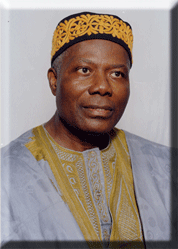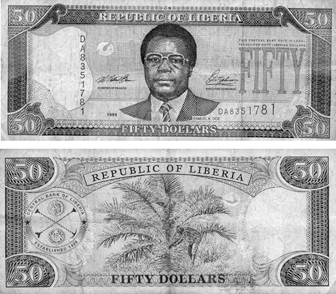2021 New Year’s Message
By Togba-Nah Tipoteh, PhD
The Perspective
Atlanta, Georgia
January 11, 2021
Dr. Togba-Nah Tipoteh Having served as Chairman of the African Group of Governors of the World Bank (WB) and the International Monetary Fund (IMF), I am aware of the principal objective of these biggest financial institutions. While the Marshall Plan focused on the rehabilitation of post-World War Two Western Europe, these Bretton Woods entities focused on providing funds globally, especially for the developing countries, who constitute most of the membership of these institutions, but the majority of the shareholdership remains in the hands of the Group of Six (United States of America, Canada, Germany, Great Britain, France, and Japan), led by the USA, with over 50 percent of the shares. Therefore, the decision-making of the WB/IMF remains under the control of the Group of Six. It was the Group of Six that approved the USD 1.2 billion loan to the apartheid regime of South Africa when Arch-Bishop Desmond Tutu led a global campaign, in which I served as Coordinator, to block the loan.
The principal objective of the WB/IMF is profit-maximization in their benefit. Whatever these institutions do has to do with the enhancement of their profitability position. It is within the foregoing context, that grants, and concessional loans are made, not forgetting the evaluation of the performance of members like Liberia.
Although the World Bank and the International Monetary Fund make forecasts and evaluations respectively at times, they make decisions in line with their profit-maximization objective. According to the World Bank, the Liberian economy experienced an average 0 percent growth during the 2014-2016 period, with negative growth of -1.2 percent in 2016. The World Bank made a forecast that growth of the Liberian economy in 2017, 2018, and 2019 would be 3 percent, 5.3 percent, and 5.7 percent, respectively; however, growth has less than 1 percent in 2019 (WB, CBL, 2020 Annual Message of the President of Liberia).
The Executive Board of the IMF concluded its Article IV Consultation on Liberia at the end of May 2019, predicting that the growth of the Liberian economy would be 0.4 percent in 2019 and remain less than 2 percent over the medium-term. The assessment report of the IMF Board on the Liberian economy, published June 11, 2019, indicated that the government of Liberia should formulate realistic budgets, avoiding extra-budgetary spending, and implement a borrowing plan to ensure debt stability and progress in public financial management. With the printing of LD 4 Billion, the government perceived solution comes during a time of high and rising unemployment (CBL, WB, AfDB). The solution to the LD shortage problem, as presented by me publicly, is in the better management of money rather than in the printing of money. The government should cut drastically its luxurious spending, as seen in non-salary expenditures, and place the savings in the CBL to be made available to the commercial banks for circulation in the economy. Grants should also be placed in the CBL and made available to the commercial banks. With an adequate supply of LD in circulation, the confidence of depositors will be restored, and hoarding will stop, and the circulation of LD will be returned to its acceptable pre-2018 level. Let us take a non-violent action now to end the long lines of people at commercial banks that have insufficient money, as corruption and the possibility for frustration-induced violence mount.
The problem of the LD shortage has been known publicly since the beginning of 2018 when such was announced by the commercial banks. Any problem becomes worse when there is a lack of Will to solve the problem. The LD problem remains unsolved because there is a lack of Will to solve the LD shortage problem. Clearly, with the persistence of vexing corruption, the placement of more money into the den of corruption remains a Non-Starter! Cut luxurious State spending and place the savings into commercial banks to increase the money in circulation adequately to restore the confidence of depositors, to stop the hoarding of LD, and promote the boarding of depositors on the Liberian Ship headed for a better landing through smooth winds. The solution to the LD shortage problem is Better Money Management Not More Money Printing.
On December 21, 2020, the IMF donated USD 38 million to the government of Liberia as additional financial assistance amid the dismal consequences of the Corona Pandemic on the already fragile Liberian economy. The Acting Chairperson and Deputy Managing Director of the IMF, Tao Zhan, praised the government of Liberia for its fiscal discipline and further improvements in cash management, transparency, and accountability in spending and domestic revenue mobilization to finance its development agenda, which was approved earlier by the IMF Board. The IMF went ahead to project a 2021 economic growth rate of 3.2 percent for the economy of Liberia. The WB/IMF global financial institutions are well known for making predictions on the economic growth of their members to suit the enhancement of their principal objective. Witness how the Liberian economy experienced negative growth rates during the pre-Civil War period with negative zero and low growth rates in the postwar period, yet the WB/IMF projected a 3.2 percent growth rate for the Liberian economy in 2018 only to have a less than one percent growth rate in 2019 (CBL Governor at the Liberian Senate; 2020 Annual Message of the Liberian President).
Furthermore, some World Bank senior staffers, in their Liberian Economy Update, predict a 3.7 percent growth rate in 2021/2022, but the World Bank is not taking responsibility for their prediction although it is made in a document bearing the letterhead of the World Bank. In the same vein, the Human Development Index (HDI), which measures growth on key socio-economic indicators of a country, puts Liberia’s ranking as 177 out of 188 countries, placing Liberia in the low development category and the second poorest country in Africa (UNDP). With the donation of US 38 million, the IMF is predicting another 3,2 percent growth for the Liberian economy in 2021.
The praising and prediction of the IMF are forthcoming while there is persistent lack of confidence on the part of depositors in the financial management capability of the government, leading to massive hoarding by depositors, and unemployment remains high (above 80 percent) and rising (CBL, WB/IMF, AfDB).
Finally, let it be known in this 2021 New Year that the Way Forward for the Better is Better Money Management Not More Money Printing

